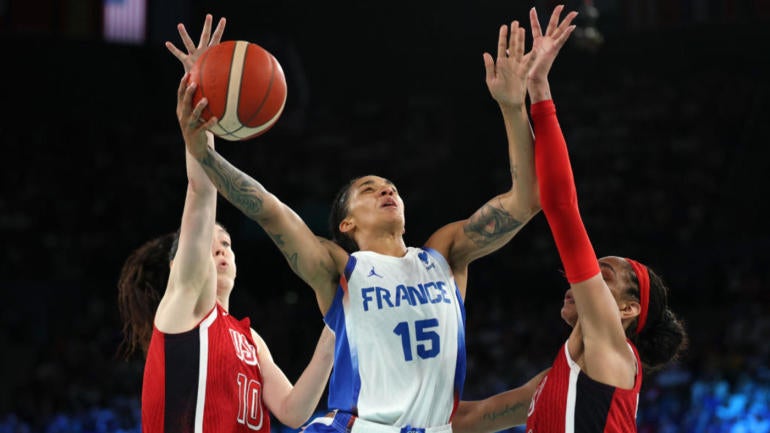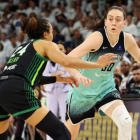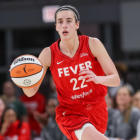
PARIS -- With 3.8 seconds left in the 2024 Paris Olympics women's basketball final, two-time NCAA champion Gabby Williams had the ball in her hand with her team down three points. She released the ball and banked it in, but instead of her team celebrating, it was once again the United States that claimed Olympic gold, its eighth straight.
Williams' feet were on the 3-point arc, meaning her shot would only count for two points.
France was INCHES from sending this game to OT pic.twitter.com/YxHrI0M2kz
— CBS Sports (@CBSSports) August 11, 2024
"I knew it was a 2-pointer straight away," Williams said in French postgame. "There were a lot of things happening. I don't know if there was a foul. If a foul wasn't [called] that's just the way it goes."
The UConn alum led Les Bleues with 19 points in the 67-66 loss to the U.S. The last time the Americans and France met in the gold medal game was during the 2012 London Olympics, when the U.S. won by 36 points. Those days are seemingly gone.
"What we've done was -- is truly inspirational," Williams said during France's final press conference of the Olympics. "I hope this will help basketball in France and in Europe grow."
Whether this growth includes stops in the WNBA is up in the air. Williams competed for the Seattle Storm last WNBA season, and her teammate, Marine Johannes, competed in the 2023 WNBA Finals with the New York Liberty. However, neither player has suited up in the league this season.
Although the French duo and Belgian standout Emma Meesseman are eligible to return, it is unclear what their WNBA future will be due to a new prioritization rule that went into effect in 2023. Last season, players were required to report by opening night, or else they will be ineligible to compete at all. This season, players were required to report by May 1 or the start of training camp, whichever is later.
While the rule instituted by the current collective bargaining agreement does make exceptions for national team play, many players from Europe consider the rule inconsiderate of their reality.
"I really said since beginning that I don't feel supported in that rule," Meesseman told CBS Sports after a quarterfinals win over Spain.
In addition to being deemed ineligible to compete if arriving after the start of training camp, the prioritization section of the CBA will suspend without pay any player who leaves to compete elsewhere. In other words, players who may want to report to another team overseas will effectively have their current WNBA contract terminated and shall be ineligible to play the following season.
"You make me choose between my home and going away," Meesseman said. "So I'm a European player, nothing is going to change that. So if you make me choose between my national team or only giving me a couple of weeks or days preparation, that's never going to happen."
Criticism of the WNBA rule gained traction during the Olympic tournament when German forward Satou Sabally was asked how the WNBA can become more global. Her response pointed to what she believes will hinder international players from having success in the WNBA.
"As a player, I obviously criticized the prioritization rule that the WNBA implemented, Sabally said. "I think it's really bad to punish International players, especially, you know, players coming from France, they can't come over at all anymore. That's just unfair. And I think the NBA does a better job of incorporating international players and also pushing them in the media."
She and younger sister Nyara Sabally currently play in the WNBA for the Dallas Wings and New York Liberty, respectively. The duo is alongside Nyara Sabally's Liberty teammate, Leonie Fiebich, comprising the core group that can anchor the German national team, which surprised many by going 2-1 in pool play and making the quarterfinals in its first Olympic appearance.
Satou Sabally, who serves on the WNBPA executive board, wants the league to do more, especially in the next CBA, to address the flaws in the rule.
"[Commissioner] Cathy Engelbert can also make a stance in really wanting to incorporate International players in a new CBA, where we are in the new negotiations," Satou Sabally said Sunday. "And I think that can be a point that we can make, like, 'Hey, maybe we were a little too drastic on the prioritization rule.'"
"I agree 100% with Satou," Meesseman said. "I don't think it's fair of them, or they ever think about how we feel about it. So I mean, there's a reason why I'm not really paying WNBA."
At the time the CBA was negotiated in 2020, Sue Bird admitted prioritization was the compromise needed to get other gains, "The league was in a place of not negotiating without it. We wouldn't have got the money, the maternity leave, without it," she said in a 2022 interview.
Bird also added she hopes the WNBA will continue to grow and become the only place players compete. That is the rule's intended purpose. Yet, maybe there is something to what Satou Sabally said. Perhaps it was an overcorrection.
"I don't know why it needs be a universal rule," Williams said. "If some teams can handle it, then let players come late or have time with their national teams. If not, then OK, they don't. But I don't understand why it has to be a blanket rule."
And maybe it will change. The 2024 Paris Olympics showcased how global basketball is, and will further become, in both women's and men's basketball. USA women's coach Cheryl Reeve believes this is a positive sign for the WNBA.
"How many nations are represented with NBA players? The same thing is going to happen in the WNBA as we continue to expand our opportunities and we continue to and globalize the sport," Reeve said postgame following her first Olympic championship as USA's coach.
For this to happen, the women's game will have to evolve beyond the current landscape, given the WNBA schedule currently conflicts with high-paying overseas leagues, including in France.
"There's things that we have to contend with there, and the WNBA prioritization, etc. I'm really hopeful that women's basketball globally can come together and solve some of these issues so that we can have these opportunities to continue to grow the game," Reeve said.
During a recent address with the media, Dallas Wings CEO Greg Bibb said the team is looking forward to having Sabally over the weekend to evaluate her fitness in the hopes she is still on track to make her season debut this month. Sabally missed the beginning portion of the season to recover from a shoulder surgery. She injured herself during Olympic qualifiers in March.
Bibb also offered his thoughts on accommodating International players.
"In terms of prioritization, that's a league CBA issue," Bibb said. "It's not a Dallas Wings issue. In terms of national team play, there are different rules that apply to prioritization, and I'm a big believer in national team play and I would never try -- even if we could, which we can't -- but I'd never try to stand in the way of a player representing her country, whether that's the United States, German, any other country."
The United States boasts elite talent, enough perhaps to field another 12-player roster that could also compete for gold. What is also true is federations like Germany, Australia, and France can, and do, develop WNBA All-Stars, MVPs and champions.
Of the five Olympic All-Stars, only A'ja Wilson and Breanna Stewart competed for the United States. Meesseman and Sabally both averaged more points per game than tournament MVP Wilson. This shows both how valuable they were for their respective teams, as well as their ability to keep up with the presumptive WNBA regular-season MVP Wilson.
Fans impressed by Sabally's performance in France will be able to see her compete with the Wings soon. Just as Megan Gustafsson fans will see her drain 3-pointers for the Aces and Ezi Magbegor work magic in the post for the Storm.
What we won't see when the league returns to action on Friday is Meesseman and Williams. Their return, alongside Marine "The Magician" Johannes, are indefinite, especially if the prioritization rule isn't amended.
Will the WNBA still boast some of the best talent in the game? Without question.
And yet, rewatching the 2024 Olympic women's basketball tournament makes one wonder if the "best" can be even better? Will we ever see Williams or Meesseman in the WNBA again?
"I mean, you know what to do," Meesseman said.

















